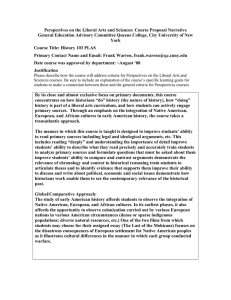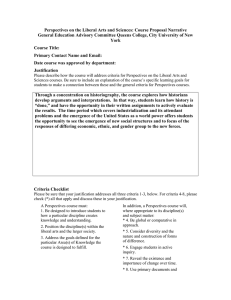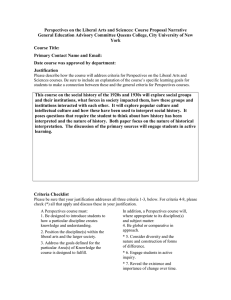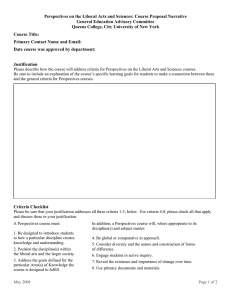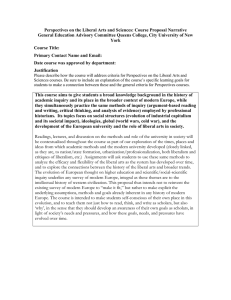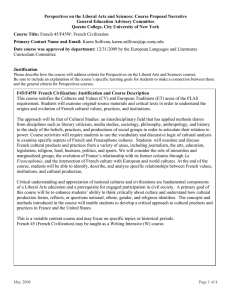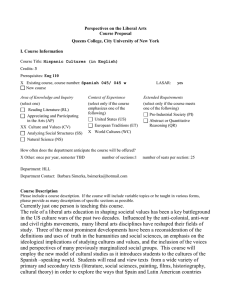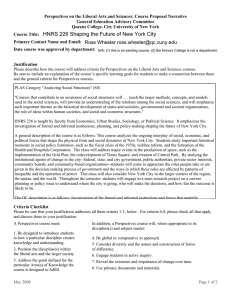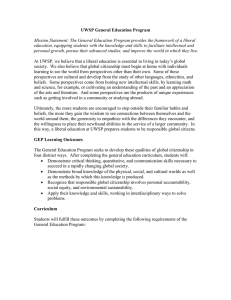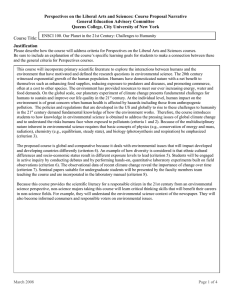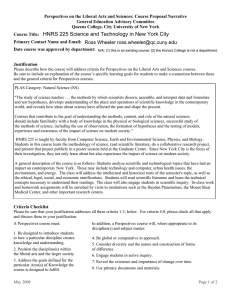Perspectives on the Liberal Arts and Sciences: Course Proposal Narrative
advertisement
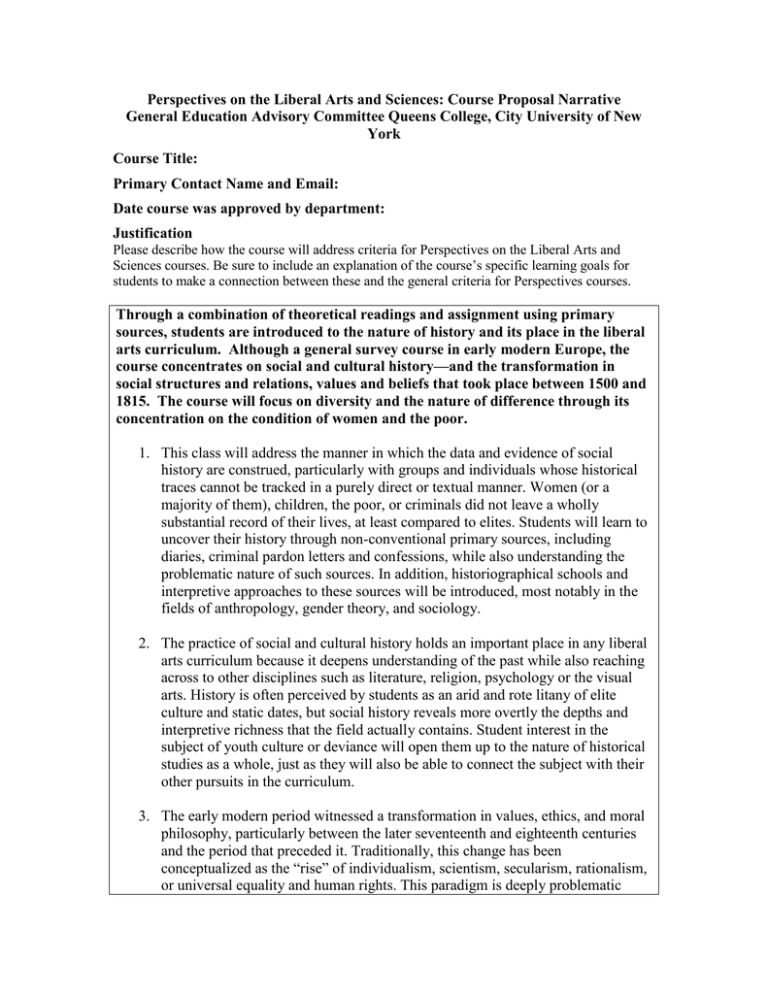
Perspectives on the Liberal Arts and Sciences: Course Proposal Narrative General Education Advisory Committee Queens College, City University of New York Course Title: Primary Contact Name and Email: Date course was approved by department: Justification Please describe how the course will address criteria for Perspectives on the Liberal Arts and Sciences courses. Be sure to include an explanation of the course’s specific learning goals for students to make a connection between these and the general criteria for Perspectives courses. Through a combination of theoretical readings and assignment using primary sources, students are introduced to the nature of history and its place in the liberal arts curriculum. Although a general survey course in early modern Europe, the course concentrates on social and cultural history—and the transformation in social structures and relations, values and beliefs that took place between 1500 and 1815. The course will focus on diversity and the nature of difference through its concentration on the condition of women and the poor. 1. This class will address the manner in which the data and evidence of social history are construed, particularly with groups and individuals whose historical traces cannot be tracked in a purely direct or textual manner. Women (or a majority of them), children, the poor, or criminals did not leave a wholly substantial record of their lives, at least compared to elites. Students will learn to uncover their history through non-conventional primary sources, including diaries, criminal pardon letters and confessions, while also understanding the problematic nature of such sources. In addition, historiographical schools and interpretive approaches to these sources will be introduced, most notably in the fields of anthropology, gender theory, and sociology. 2. The practice of social and cultural history holds an important place in any liberal arts curriculum because it deepens understanding of the past while also reaching across to other disciplines such as literature, religion, psychology or the visual arts. History is often perceived by students as an arid and rote litany of elite culture and static dates, but social history reveals more overtly the depths and interpretive richness that the field actually contains. Student interest in the subject of youth culture or deviance will open them up to the nature of historical studies as a whole, just as they will also be able to connect the subject with their other pursuits in the curriculum. 3. The early modern period witnessed a transformation in values, ethics, and moral philosophy, particularly between the later seventeenth and eighteenth centuries and the period that preceded it. Traditionally, this change has been conceptualized as the “rise” of individualism, scientism, secularism, rationalism, or universal equality and human rights. This paradigm is deeply problematic even as it is pedagogically useful; one of the aims of this class, however, is to question its (triumphalist) assumptions, particularly in understanding how other cultures in the past, including those which persecuted or stigmatized different or subordinate groups, worked in accordance with a worldview, a context, and a set of (religious) values that were comprehensible, if not always morally justifiable by today’s standards. 4. “The Social and Cultural History of Europe” is comparative in approach as it contrasts the condition of women, the poor, or societal norms across the course of three pivotal and changing centuries. The conception of childhood and treatment of children, for example, was very different in 1800 than it was in 1500, and students will come to understand not only the trajectory of such transformations, but the historical contingencies on which those conceptions and treatment rest. Similarly, students will be able to compare methods of conquest and colonization between those of the Spanish and Portuguese in the early sixteenth century, and more modern ideologies and technologies of empire that emerged in the eighteenth century. The thematic approach that this course assumes will illuminate these contrasts for students in a manner that could not be accomplished from within a purely chronological framework. 5. This central theme of this class focuses on diversity and the nature of difference, specifically in the manner in which the dominant classes and interests of society approach those groups or individuals defined as “different” or subordinate. In their marginalization or subordination, such groups served to reinforce the norms and societal standards of society, and thus were integral elements in defining that society. The “containment” of such individuals in prisons or within a larger structure of familial or colonizing ideologies also reflects the methods by which societies manage and control potentially problematic or subversive elements in their midst; individuals or groups, however, devised their own strategies of agency or resistance, which reveals society as more fluid and multivocal in its interrelationships, rather than one in which power asserts itself without any response by those it affects. 6. Students will actively engage in the course through a number of writing- and analytically-related assignments that call on them to read heavily in primary sources (see #7) and to apply a number of interdisciplinary approaches to those sources. Assignments will call on them to apply anthropology, for example, to the witchcraft prosecutions that were unique to the early modern world, to incorporate sociological analysis to food and religious riots or revolutionary revolt, or to utilize theorists such as Foucault (and his critics) when examining the history of punishment. Classes will also be divided into groups that collectively and orally report upon one of the subjects (women, the colonized), and will be expected to guide discussions that ensue. 7. The world of 1815 is much more familiar to present-day perceptions of family, sex, marriage, imperialism, class or criminality; but as students will come to understand, such perceptions were entirely different in 1500, and took centuries to assume the form they did. The process of this change over the longue durée will be tracked throughout the class, with students examining the influence of economic, religious, cultural, and political factors in effecting that change even as deep continuities also exist within the centuries under consideration. 8. The reading and analysis of primary sources will be emphasized throughout the course, particularly as they represent more unconventional texts of historical inquiry. Diaries, prison records and testimonies, or popular print and visual media will be closely read, and students will be required to write about the strengths and weaknesses of such sources, and the variable manner in which they can be read or mis-read by scholars. Criteria Checklist Please be sure that your justification addresses all three criteria 1-3, below. For criteria 4-8, please check (*) all that apply and discuss these in your justification. A Perspectives course must: 1. Be designed to introduce students to how a particular discipline creates knowledge and understanding. 2. Position the discipline(s) within the liberal arts and the larger society. 3. Address the goals defined for the particular Area(s) of Knowledge the course is designed to fulfill. In addition, a Perspectives course will, where appropriate to its discipline(s) and subject matter: * 4. Be global or comparative in approach. * 5. Consider diversity and the nature and construction of forms of difference. * 6. Engage students in active inquiry. * 7. Reveal the existence and importance of change over time. * 8. Use primary documents and materials. May 2008 Page 1 of 2 Course Materials, Assignments, and Activities Please provide an annotated list of course readings and descriptions of major assignments or exams for the course, as well as distinctive student activities that will engage students in working toward the course goals discussed in the course description and/or justification. Please include the author and title for each reading or text, along with a short description providing information about how the reading will contribute to course goals. The initial readings by Kaestle, Hobsbawm, Jenkins, and Joan Scott, the students will be introduced to theoretical concepts about the nature of history and historical analysis. The subsequent readings in the early part of the semester focus on women, family, childhood and explore how significant were the changes taking place in those areas. Difference is further explored in two weeks readings devoted to “marginality” (e.g. criminality, prostitution etc). Two weeks following focus on global dimensions— Europe’s encounters with the new world. The course then ends with a focus on the poore, manifestation of protest, and popular culture. Assessment Perspectives courses must be recertified every five years, and we are seeking ideas for how to best carry out this assessment. What forms of evidence that the course is meeting its goals as a Perspectives course would be appropriate to collect for this course during the next five years? How would you prefer assessment to be conducted? How might evidence of effective teaching and student learning be collected and evaluated? The department will create an assessment committee to evaluate its PLAS courses. An evaluation of written assignment in relation to the goals of the course will be part of that evaluation. Other means of assessment will be developed by the committee. Including possibly an examination in which the student use original sources to create a historical essay. Administration What process will your department develop to oversee this course, suggest and approve changes, and conduct assessment? Who will be in charge of this process? Also indicate whether the course will be primarily taught by full-time or adjunct faculty, or by a combination of the two types of instructor. There will be an assessment committee whose task will be to assess the Gen. Ed. Courses and recommend changes to the Departmental Curriculum Committee. The course will be taught by a combination of full-time and adjunct faculty. Meetings between full-time faculty and adjuncts will explain the goals of PLAS, develop approaches to achieve those goals, and assure that there are common strategies used. May 2008 Page 2 of 2
